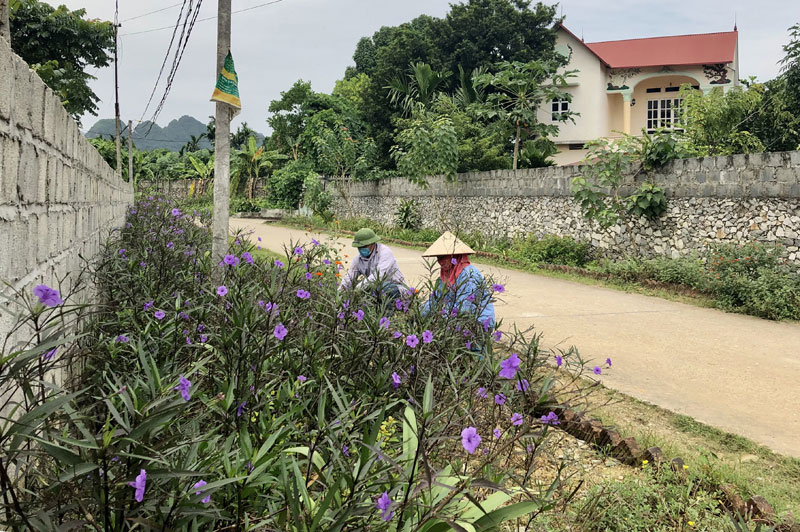
(HBO) - Thanh Ha village in Luong Son district’s Thanh Son commune has been recognised as a model new-style rural area. Coming to the village, we were impressed by the local hospitality, and clean and beautiful landscape.
 Thanh Ha residents grow flowers along the sides
of the road to create a clean, beautiful and green landscape.
Thanh Ha residents grow flowers along the sides
of the road to create a clean, beautiful and green landscape.
Tran Duc Manh, head of the village said this year Thanh Ha was honoured as it was selected
for building a model new-style rural area.
The village’s Party cell has paid special
attention to mass mobilisation and public communications work from the beginning,
he said, adding that the cell had assigned Party members to persuade each
family to participate in implementing criteria of a model new-style rural area.
As a result, local residents have joined in planting flowers along 1,000 m of
roads and concretising 1.5 km of roads.
The work has created a driving force for locals
to shakeup the structure of their crops and husbandry, apply technologies, and
replace low-value trees in their gardens with citrus trees which produce higher
economic value. Of the total 136 households in the village, 123 have renovated their
gardens. The village currently has nearly 90 hectares of citrus trees, with a
local garden of Tran Duc Hung and his family recognised as a model garden. In 2020,
the average per capita income of the village is estimated at 41 million VND
(1,775 USD), with no households rated as poor. Thanh Ha has seen 84.6 percent
of its households obtaining the cultural family tittle. The village has sustained
the title of cultural village since 2010.
The village has also focused on creating a green, clean, and beautiful landscape. All 136 households have access to hygienic drinking water. Among
101 households engaging in animal raising, 93 have built barns meeting environmental sanitation standards. Locals are now aware of the classification and treatment of
waste, while the local road system has drainage ditches. The discharge of garbage and pesticide bottles into rivers and streams is strictly
prohibited, while once a week, all villagers join
in cleaning the entire village./.
On May 15, the Hoa Binh Steering Committee for Science, Technology, Innovation, and Digital Transformation launched the "Digital Literacy for All” movement. The event was held both in-person and virtually, connecting provincial authorities with district-level Party committees and local communities across communes, wards, and townships.
The People’s Committee of Hoa Binh province on May 16 held a conference to honour outstanding intellectuals for their contributions in 2025.
The Standing Board of the Hoa Binh provincial Party Committee has held a conference to announce the provincial Party Committee’s decision about the merger of Hoa Binh Newspaper and the provincial Radio and Television Station, along with the Standing Board’s appointment decisions.
After the historic victory on April 30, 1975, which liberated the South and reunified the country, the whole Vietnam embarked on a new mission — promoting peace and reconstructing the nation with century-defining projects. On the fierce Da River, over 30,000 engineers, sappers, and construction workers battled against rocky mountains and raging floods to achieve a remarkable feat. The Hoa Binh Hydropower Plant, the largest of its kind in Southeast Asia at that time, officially began generating electricity, lighting up the North and ushering in a new era of industrialisation.
Muong Dong in Kim Boi district, one of the four major Muong regions in Hoa Binh province, is harnessing its revolutionary legacy and cultural heritage to drive socio-economic transformation.
Throughout April, the joyful atmosphere of the 50th anniversary of the Liberation of the South and National Reunification spread nationwide. Together with the whole country, residents in Hoa Binh city also expressed their patriotism through meaningful and practical actions.



 Thanh Ha residents grow flowers along the sides
of the road to create a clean, beautiful and green landscape.
Thanh Ha residents grow flowers along the sides
of the road to create a clean, beautiful and green landscape.